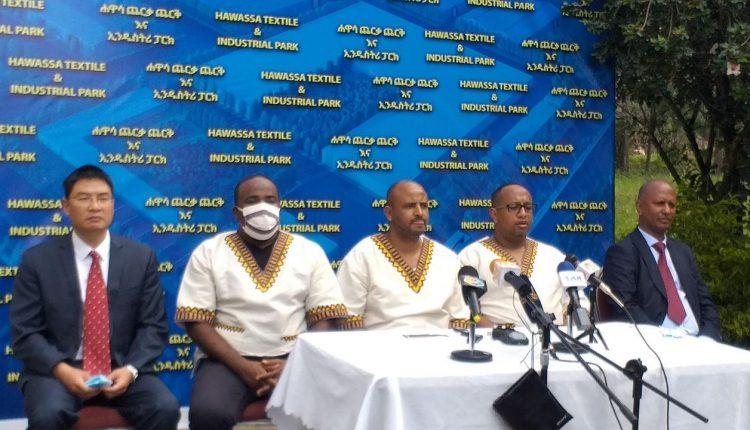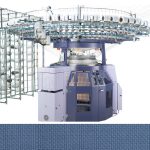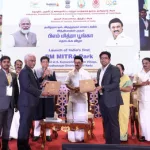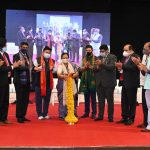 A Chinese construction firm, SINOMA Engineering, has started constructing a new industrial park in Hawassa town, the regional capital of the newly formed Sidama regional state.
A Chinese construction firm, SINOMA Engineering, has started constructing a new industrial park in Hawassa town, the regional capital of the newly formed Sidama regional state.
Hired by the Hawassa Textile and Industrial Park S.C., SINOMA Engineering will undertake the construction of the garment industrial park. In the past, Sinoma has built the Dangote Cement factory and was involved the development of the Hawassa and Dire Dawa industrial parks.
President of the Sidama Regional State, Desta Ledamo, and Ambassador Mesganu Arega, State Minister of Trade and Industry, have laid a corner stone for the construction of the new private industrial park on September 6, 2020.
Ahmed Abderuf, CEO of the Hawassa Textile and Industrial Park S.C., told a press conference that the new industrial park will have 14 shades each lying on 11,000 square meter of land. Ahmed said the industrial park will have all the required facilities convenient for garment manufacturers. The industrial park will have banks, telecommunication and customs offices. The total cost of the project is estimated at two billion birr. SINOMA has assured the clients that it would complete the construction in less than a year time.
Popular global garment companies are expected to lease shades and start manufacturing garments once the construction of the shades is completed. “Already internationally recognised garment companies such as GAP have approached us to secure shades,” Ahmed told local reporters.
Ahmed said the Hawassa Industrial is fully occupied and the garment companies working in the industrial park are looking for additional shades for expansion. “As their businesses are growing they need to expand and they are looking for more shades. The fact that we are building the new industrial park very near to the Hawassa Industrial Park and there are 120,000 trained youth in the town it would be convenient for them to lease shades from us,” he said.
Ethiopia has set out an ambitious plan to become a manufacturing hub in Africa by 2030. The government has been striving to transform the textile and garment industry. “Ethiopia is building a good will in the global garment industry like Bangladesh and Siri Lanka. In a few years’ time, the textile and garment export would be competing with coffee and oil seeds export,” Ahmed said.
Ninety percent of the products manufactured in the industrial park will be exported, according to Ahmed. The industrial park will create 30,000 job opportunities for the local community.
Three Ethiopian investors— Tamrat Damena, Alamin Mohammed and Ahmed Abderuf—established the Hawassa Textile and Industrial Park S.C. with a registered capital of 600 million birr and acquired the Hawassa Textile Factory three years ago. The investors paid 500 million birr to acquire the 30-year old textile factory built by the former government of Ethiopia in collaboration with the Italian government in 1989.
The investors are importing and replacing the aging machineries. They have bought new machineries at a cost of 200 million birr. “We are building a new production line. Most of the machineries are installed. We have few more coming from Djibouti. We will complete the installation of the first production line and start production in three month time,” Ahmed said.
The Hawassa Textile Factory used to produce fabric threads, bedsheets and uniforms. But now the investors have decided to manufacture only fiber threads and supply it to local and foreign markets.
The first production line will have a daily production capacity of seven tons of thread. The second line will also produce seven tons. When the ongoing expansion work is completed the factory can manufacture 14 tons of fabric threads daily.
In his opening remark, Ambassador Mesganu Arega disclosed that the new industrial park will open more than 30,000 jobs and fetch 250 million dollars in export earnings. Mesganu said since the industrial park will create significant number of jobs for the local community and bring the much needed foreign currency to the country; and the federal government as well as the Sidama Regional State would provide all the required assistance to the project. “The expansion of the old Hawassa Textile Factory would enable the factory to produce fabric threads and supply them to the local garment factories and substitute the imported threads. They would also export the threads and bring foreign currency. This goes hand in hand with our government’s industrial policy that attempts to transform the manufacturing industry and boost the contribution to the national economy from the current 17 percent to 34 percent. Hence, the Ministry of Trade and Industry, Investment Commission and the regional state will closely monitor and provide all the required assistance to the project,” Mesganu said.
The guest of honour, Desta Ledamo expressed his delight with the launch of the industrial park. “We are grateful that you decided to invest two billion birr in our region and create 30,000 jobs for the youth at a time when our economy is affected by the impacts of the COVID-19 pandemic,” Desta said.
“Investment needs peace and stability. If we need jobs and foreign currency we have to take care of this project and support the investors,” he told the gathering.
According to Desta, the Sidama Regional State has put in place the necessary structure that enables it to attract investment. “Peace has prevailed in our region. We need local and foreign investors to come and invest in our region which is endowed with natural resources,” the president said.
The proximity to the capital Addis Ababa, and the availability of trained man power makes Hawassa a preferred investment destination. The express way that connects the city with Addis Ababa is near completion and an airport has been built.
Currently, there are 12 industrial parks in the country out of which seven are operational. The remaining parks will become functional in the coming Ethiopian New Year. Textiles, garments, pharmaceuticals and medical equipment are some of the products to be manufactured in the industry parks.
Awassa Textile and Industrial Park S.C, a local company established by three Ethiopian investors, is going to build a privately-owned industry park in Hawassa town at a cost of two billion birr. Awassa Textile and Industrial Park S.C. was established three years ago by three Ethiopian entrepreneurs –Tamrat Demena, Alamin Mohammed and Ahmed Abderuf— with a registered capital of 600 million birr. The company acquired the state-owned Awassa Textile Factory through privatization in 2017. The Awassa Textile Factory, which was established in 1989 by the Ethiopian government, was ailing for many years. The factory was known for the production of bed sheets, foam mattress covers, school uniforms, workers’ uniforms and fabric threads. The former Privatisation Agency had handed it over to foreign and local investors at different occasions. But, none of them brought about the much desired change and resurrect the old factory. The investors could not turn around the factory and put it on the right track to success. In fact, the textile factory was highly indebted to the Development Bank of Ethiopia (DBE) and ceased operation for a long time. The factory was languishing with mountains of debt that brought it down to a standstill. After going through many ups and downs, the new investors managed to replace the aging machineries and brought the factory back to life. The factory which has 1,200 employees on its pay roll is now manufacturing fabric threads. The Awassa Textile Factory lies on a vast land measuring 350,000 sq. m. Awassa Textile and Industrial Park S.C. is now under preparation to develop a garment industry park on unutilized land that belonged to the factory at an investment cost of two billion birr, it was learnt. It is reported that the company will build 14 shades in the coming twelve months. Leading global garment companies will join the industrial park and popular garment brands will be manufactured here. The new industrial park is projected to create 35,000 job opportunities to the local community.
(Courtesy: The Reporter, Ethiopia)





